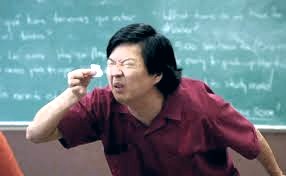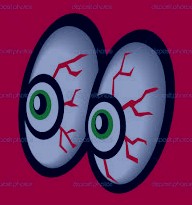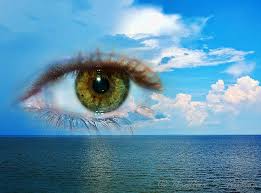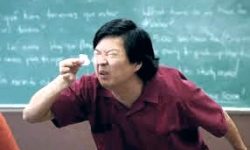In my 20s I briefly dated a hard-driving businessman. He seemed like a coiled spring to me, ready to burst into frantic action at any moment. (Yes, he drank coffee non-stop.) I remember once suggesting he relax a bit. He indignantly replied “I am relaxed!”. He was so used to being all wound up that he thought that was normal.

Like most things, this memory leads me to consider vision, and eye health. Did I really think my eyes were relaxed and comfortable back when I wore those thick hard plastic contact lenses? I used to pride myself on being tough, and maybe even got some satisfaction out of tolerating the discomfort of the contacts. I used to say I’d put rocks in my eyes if it would help me see! Relatively clear sight was essential, while visual comfort wasn’t even a consideration. Could you be tolerating some inconvenience or even pain, visual or otherwise, which isn’t necessary?

Wearing contact lenses, and those thick glasses I wore throughout my childhood, put the focus on visual performance, taking it away from how my eyes and brain felt. How well I could see was the only measure of whether I was OK or not. If my eyes were tired or irritated, or didn’t want to look at something, or were bloodshot, or were over-sensitive to light, or showed any other indication of eye strain, that didn’t matter.
When I started vision improvement and realized my eyes were giving me feedback all the time as to how they were doing, I was dismayed to find how seriously I’d been abusing my visual system. My eyes were like starving children pushed to work in the fields all day, and then I was surprised when they complained. I could definitely do better.
Now I rarely get eye strain. When I do it’s a surprise to find I’ve been straining my eyes, often at the computer or while driving. Then it’s clearly time for a break, and to assess what I’ve been doing unconsciously to make my visual system feel so stressed. In these situations I may be pushing myself to complete some task I don’t really want to do. When driving I might be focused on reaching my destination, on “getting there”, and not on enjoying the sights along the journey.

Take a moment to check in with your own eyes. Maybe even go look at them in the mirror. Are they peaceful and receptive gazing back at you, or strained and suffering? When I look at my eyes they’re usually smiling at me now, appearing softer, less fearful, and calmer than they did 20 years ago. My brow is smoother too. What would it take to look at your world with no tension?
The theme of appreciating my vision, and enjoying the images it brings my way, is the foundation for my healthy seeing habits. If I have a high-performance expensive car, I’ll take care of it. And how much more valuable and precious than any car are my eyes! When I use them to look in a leisurely way, not straining, I’m more likely to enjoy what I see. I can receive the view without rushing, savoring as I look. This helps me feel relaxed in my brain and body, nourishing my visual and intellectual progress. Look, learn, and grow. Look and live!
get help on our Facebook Group!

I wore strong glasses, then contact lenses, from age 5 into my 40s. While making many mistakes, eventually l learned how to improve the way I use my eyes and to see in a more relaxed, healthy manner. It is my pleasure to coach others to do the same. Visit me at https://NancyLNeff.com.

Lawrence, you seem determined to argue with me. I do think Dr. Bates was a genius, and I am not saying all mechanical devices are useless! Most of the vision improvements I have seen came from a combination of improved personal visual habits and learning to be present, aware, and relaxed. This is true of others I know and of myself.
And since you asked about imagination, here’s an old post where I used my imagination in combination with my looking to let the image become clearer. https://dreamersight.wordpress.com/2012/08/28/unplanned-vision-practice/
Ok, there is the polygraph tool, the retinoscope, the Scientology E-meter, all scientific tools. Your early life, technical- must pull the mind—– somewhat toward the scientific. Ok, aside, do you have results with corrective mental tools, specifically the imagination, so say Genius Dr. Bates. ?
I think he used some type of instrument to detect shadows on light entering the eye so maybe with electronics something could be made to detect when eyes strain?
Lawrence, I believe you’re referring to the retinoscope, which is still used today. From Wikipedia: “Retinoscopy is a technique to obtain an objective measurement of the refractive error of a patient’s eyes. The examiner uses a retinoscope to shine light into the patient’s eye and observes the reflection (reflex) off the patient’s retina. While moving the streak or spot of light across the pupil the examiner observes the relative movement of the reflex or manually places lenses over the eye (using a trial frame and trial lenses) to ‘neutralize’ the reflex.”
And I don’t need an instrument to tell me if I’m straining my eyes — I can feel it! Or I can glance at one of my many eye charts, and if the letters don’t clear pretty quickly, I’m straining my eyes more than I want to admit. The feedback from your visual system, the level of clarity and comfort, is invaluable information.
Yes total correct, but it’s rapid and reasonable improvement, otherwise all readers are lost, I think it may take some type of electronic device when we strain to see, so say Bates.
Lawrence, hi. As far as I know Dr. Bates never recommended any electronic device to see better, so I’m not understanding you about that. (Note he lived over 100 years ago.) I agree some people are impatient and want an instant cure. Part of the natural vision improvement process is learning to appreciate even small improvements at the start, not to be angry that they’re not bigger. Lifelong wrong habits of looking may take some time to shift.
You’re welcome, Swathi, and thanks for your interest. Feel free to spread the word that vision improvement is easy and natural! 🙂
Thank you, Swathi. You can see all the blog posts on this site here: https://www.iblindness.org/all-posts/.
Thanks a lot dear😊
Thank u so much.your article is helpful.i want more like this☺😊👍
Christopher, hi and thanks! With the internet no one is alone now 🙂 and I love to see all this information getting out there so we can learn to help ourselves. I have clients I see on Skype regularly who are not even on the same continent I am. If you’re interested in a brief consultation about working with me further, you can request that here: http://nancylneff.com/discovery.htm.
Love your input… alone in Cape Town. just feel connected with your – is it called blog